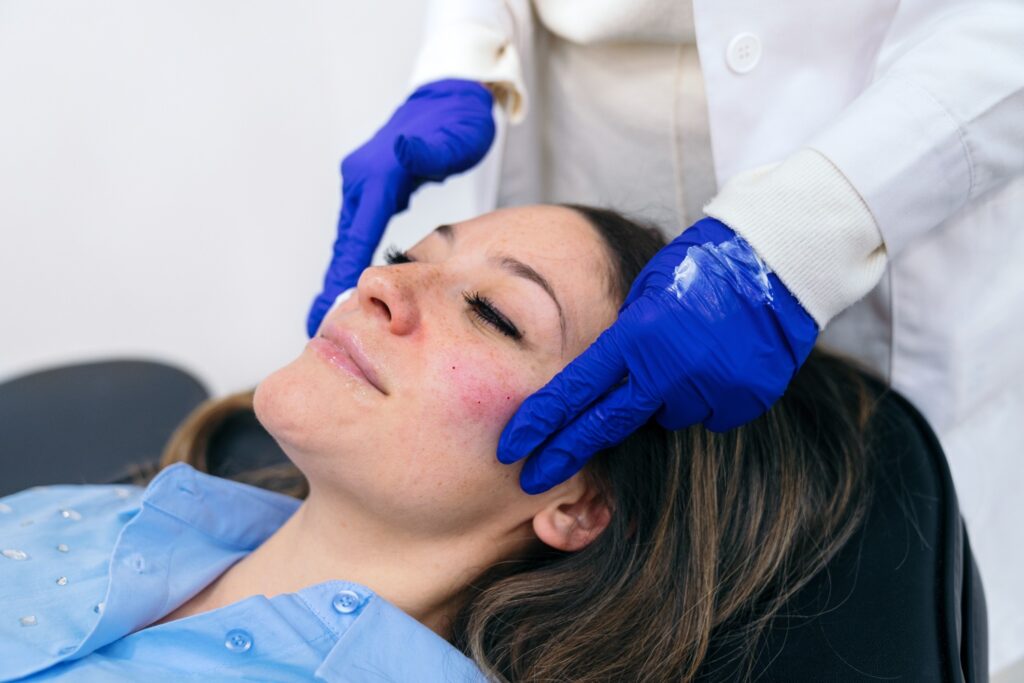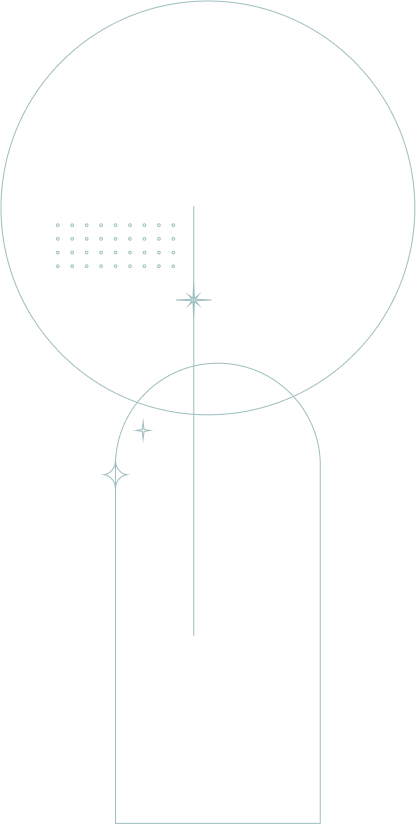
Menopause can cause dramatic changes in a woman’s body as hormones such as oestrogen start to drop. Aside from reproductive changes, women also experience shifts in skin health as hormonal changes affect skin and blood vessel health.
For those with chronic skin conditions such as rosacea, menopause leads to increased flare-ups, intense symptoms, and worsening irritation. It’s unbearable living with rosacea when you’re juggling with menopause!
Luckily, there are ways to help menopausal women deal with rosacea. By appropriately managing symptoms, avoiding triggers, and using the most effective laser treatments, you can manage menopause with minimal rosacea flare-ups.
Dr Refresh is a leading Sydney specialist cosmetic dermatology clinic and we specialise in treating rosacea through advanced laser treatment and helping men and women control their symptoms.
How Menopause Affects Your Skin & Rosacea Symptoms
During menopause, the ovaries stop releasing eggs, dramatically reducing oestrogen and progesterone. This hormone drop dramatically affects the hair and skin, as oestrogen is vital to skin health, affecting collagen production, elasticity, and hydration. Women undergoing menopause usually develop dryness, thinning, and skin wrinkling. Blood flow also changes, and the skin becomes more sensitive.
These changes can worsen rosacea symptoms. Women may become more sensitive to triggers such as changes in weather, food and beverages, and stress and thus experience flare-ups more often than usual. Skin becomes more prone to inflammation, causing new bumps and redness.
Hot flashes during menopause involve the dilation of blood vessels on the face. These flashes can trigger flushing in rosacea and worsen symptoms. Also, hormonal shifts during menopause lead to emotional changes and stress, which may also trigger rosacea.
Recognising Rosacea Flare-Ups During Menopause
Rosacea flare-ups are more common and often more intense during menopause.
- Redness: This is a hallmark sign of rosacea, and in mild cases of rosacea, redness may disappear after the trigger has been removed. In moderate to severe rosacea, redness lasts longer, even after the trigger has disappeared. Meanwhile, during menopause, the skin becomes more sensitive to triggers; thus, redness and irritation are expected even with slight exposure.
- Flushing: This is another common symptom of rosacea, but during menopause, flushing becomes more intense. Aside from this symptom, women also experience flushing or rapid dilation of blood vessels. They experience increased discomfort and irritation.
- Inflammation: In moderate to severe rosacea, the affected skin is inflamed intensely. During menopause, the skin becomes more sensitive, exacerbating rosacea inflammation and leading to irritation, dryness, and severe discomfort.
- Acne-like symptoms: Moderate rosacea is often mistaken for acne as pustules appear, causing intense changes in skin appearance and texture. Acne breakouts are common during menopause as fluctuating hormone levels increase oil production and clog pores.
Generally, rosacea symptoms during menopause are intense and become more complicated to manage. Addressing hormonal changes becomes a critical part of managing rosacea during this time.
Hormones & Rosacea: The Important Connection
Oestrogen and progesterone levels drop during menopause. Hormones play a role in reproduction and also influence skin health. When hormone levels fluctuate, the skin becomes dry and sensitive, making women with rosacea more vulnerable to triggers.
Even short exposure to sunlight or slight temperature changes can trigger rosacea in menopausal women. Symptoms such as redness and irritation may last longer and worsen as hormone levels drop.
Effective Treatment Options for Menopausal Rosacea
The following are available rosacea treatments suitable for menopausal women ( but also for men who suffer from rosacea)
Laser & BBL Therapy
Both laser and intense pulsed light (IPL) therapies effectively reduce redness, inflammation, and visible blood vessels. BBL is a second generation IPL that when used effectively, is the Rolls Royce of IPL technology. These treatments use light energy to target the blood vessels responsible for redness in rosacea. The blood vessels clot and are absorbed by the body, improving the skin’s appearance and texture.
Topical & Oral Treatments
Rosacea during menopause may be managed using topical and oral medications. Topical ivermecti, metronidazole, azelaic acid, and brimonidine reduce inflammation and redness. Oral antibiotics such as doxycycline or minocycline prevent, treat and control inflammation. These treatments are great additional regimens for rosacea, but they cannot treat the redness of broken capillaries or the flushing that is the hallmark of rosacea. Lasers remain the most effective in improving the appearance of rosacea skin.
Skincare and Lifestyle Changes
Management of menopause and rosacea symptoms requires careful lifestyle changes and shifts in your regular skincare regimen.
- Visit your dermatologist to help manage rosacea symptoms.
- Identify and avoid your triggers (certain foods or beverages, environmental factors, stress, etc.)
- Using gentle skincare products such as moisturisers to prevent dryness
- Avoid skincare products with excessive fragrance.
- Apply broad-spectrum SPF 30 sunscreen daily, even during overcast days.
- Stay cool and avoid environments that can trigger flushing.
- Get enough rest and avoid over exertion during exercise.
- Consult your doctor about hormone therapy.
Why Laser Therapy is Ideal for Menopausal Rosacea
Laser therapy is the best treatment for women with menopausal rosacea because it is effective. Laser therapy precisely targets visible blood vessels to reduce their appearance. These treatments can reduce overall redness, inflammation, and discomfort.
With laser therapy, women can expect improved skin texture and a more even and smoother complexion. This is an additional benefit, as menopausal skin is usually thinner and drier.
They can also expect long-term improvements with their rosacea, as laser therapies target dilated blood vessels that cause redness and inflammation. Laser treatments also decrease the need to use oral or topical medications, which can be overwhelming for women who are also taking hormonal therapies and maintenance medications.
Choosing the Right Laser Treatment with Dr Refresh
Dr Refresh offers the most effective laser treatments for menopausal women with rosacea. Our clinic in Ultimo uses the most advanced technology and equipment to manage rosacea symptoms effectively, including broadband light (BBL), picosecond Laser, ND-Yag vascular laser, and erbium and CO2 lasers.
Is menopause making your rosacea symptoms worse? Schedule a consultation with Dr Ritu or her specialist clinical staff to discover how we can help. Call the Dr Refresh team at (02) 8014 6500 to book a consultation. Alternatively, you can also enquire and book online.
Frequently Asked Questions
1. Why does rosacea often worsen during menopause?
Rosacea symptoms worsen during menopause as the skin is more sensitive due to hormonal fluctuations.
2. Are laser treatments safe during menopause?
Yes, laser treatments are safe for menopausal women. Laser therapies can address redness in rosacea by targeting dilated blood vessels on the face. A dermatologist can determine the best treatment for rosacea during menopause.
3. Will my rosacea go away after menopause?
No, it will not go away after menopause. You will only find it easier to manage your symptoms as your skin will no longer be as sensitive.
4. Can hormonal treatments improve rosacea?
Hormonal treatments are part of managing rosacea during menopause. These treatments can help improve skin health, thus making it easier to manage symptoms.

